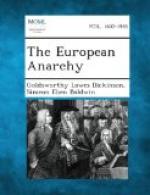the
National Review is England. Germans,
in fact, during recent years have taken a prominent
place in pacifism as well as in imperialism.
Men like Schuecking and Quidde and Fried are at least
as well known as men like Treitschke and Bernhardi.
Opinion in Germany, as in every other country, has
been various and conflicting. And the pacific
tendencies have been better organized, if not more
active, there than elsewhere, for they have been associated
with the huge and disciplined forces of the Social-Democrats.
Indeed, the mass of the people, left alone, is everywhere
pacific. I do not forget the very important fact
that German education, elementary and higher, has been
deliberately directed to inculcate patriotic feeling,
that the doctrine of armed force as the highest manifestation
of the State has been industriously propagated by
the authorities, and that the unification of Germany
by force has given to the cult of force a meaning
and a popularity probably unknown in any other country.
But in most men, for good or for evil, the lessons
of education can be quickly obliterated by the experience
of life. In particular, the mass of the people
everywhere, face to face with the necessities of existence,
knowing what it is to work and to struggle, to co-operate
and to compete, to suffer and to relieve suffering,
though they may be less well-informed than the instructed
classes, are also less liable to obsession by abstractions.
They see little, but they see it straight. And
though, being men, with the long animal inheritance
of men behind them, their passions may be roused by
any cry of battle, though they are the fore-ordained
dupes of those who direct the policy of nations, yet
it is not their initiative that originates wars.
They do not desire conquest, they do not trouble about
“race” or chatter about the “survival
of the fittest.” It is their own needs,
which are also the vital needs of society, that preoccupy
their thoughts; and it is real goods that direct and
inspire their genuine idealism.
We must, then, disabuse ourselves of the notion so
naturally produced by reading, and especially by reading
in time of war, that the German Jingoes are typical
of Germany. They are there, they are a force,
they have to be reckoned with. But exactly how
great a force? Exactly how influential on policy?
That is a question which I imagine can only be answered
by guesses. Would the reader, for instance, undertake
to estimate the influence during the last fifteen
years on British policy and opinion of the imperialist
minority in this country? No two men, I think,
would agree about it. And few men would agree
with themselves from one day or one week to another.
We are reduced to conjecture. But the conjectures
of some people are of more value than those of others,
for they are based on a wider converse. I think
it therefore not without importance to recall to the
reader the accounts of the state of opinion in Germany
given by well-qualified foreign observers in the years
immediately preceding the war.




